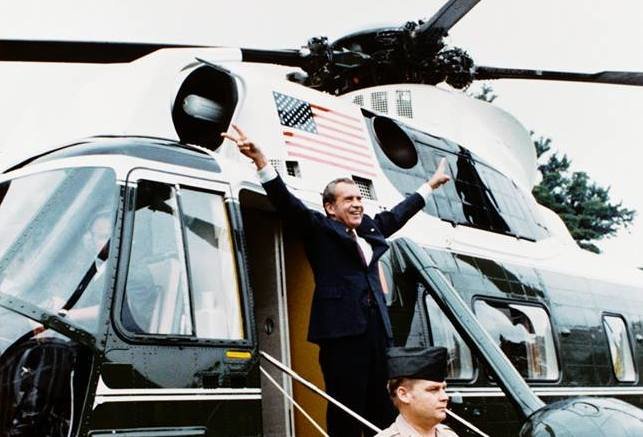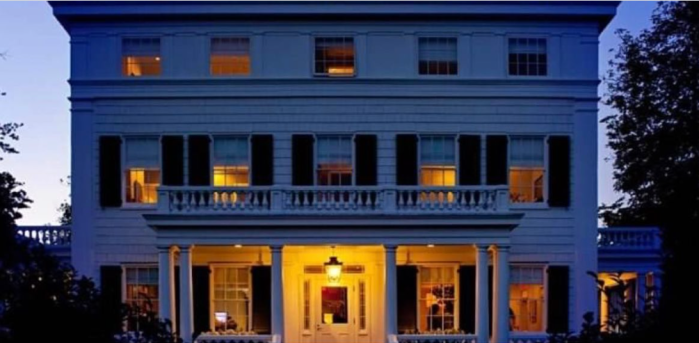A week is not enough time to absorb the impact of this historically divisive presidential election. It’s natural to be reeling, considering how wrong the polls were about Hillary Clinton’s prospects and how the outcome could harm the planet, let alone the country.
The stunning results apparently surprised even Donald Trump, seeing how unprepared his transition team is to take power.
This shock is how I felt watching the electoral returns in 1972 when President Richard Nixon obliterated the anti-Vietnam War candidate Sen. George McGovern from South Dakota. “Tricky Dick” Nixon, as he was dubbed, took every state but one. And that’s where I was then going to college: Boston University in Massachusetts.
The year before, the protest slogan, “Old enough to fight, old enough to vote,” had finally been put to rest by the passage of the 26th Amendment, which lowered the voting age to 18.
When I got to cast my first vote for president, I was 19, but more importantly, my draft lottery number was 243. I thought that only if China invaded South Vietnam would I ever be drafted, but I was a die-hard McGovern supporter in solidarity with those other young men whose fates were up for grabs by the Pentagon and the president.
The night of Nov. 7, 1972, my B.U. buddy, Scott, and I were on assignment. Our journalism professor had told the class to pick a political candidate and join him or her on election night. Since I had a car, we decided to go outside Beantown to the campaign headquarters of Rep. Robert Drinan, a Jesuit priest who was ardently opposed to the Vietnam War and was running for re-election. His outspokenness had made him a national figure so we got to watch professional reporters in action—and share in the booze put out in the press room. Scott observed that the scotch bottles went empty first.
As the night wore on, we noticed that everybody there was getting smashed—but not because they were celebrating Father Drinan’s victory. It was more like an Irish wake. They were coping with the stunning defeat of their presidential choice, Sen. McGovern. I’ll never forget watching the TV map turn red, all except for Massachusetts and Washington, D.C. McGovern didn’t even carry his home state. How could my country get it so wrong? I felt absolutely betrayed. Nixon was a crook! He should never have been re-elected, but he had won by almost 18 million votes, one of the widest margins in American history.
On the night of June 17, 1972, burglars had broken into the Democratic National Headquarters at the Watergate complex in D.C. They got busted. The incident barely made a ripple in the national news until two dogged metropolitan reporters from the Washington Post, Carl Bernstein and Bob Woodward, got a tip to “follow the money,” and it took them to campaign cash dispensed by the Committee to re-elect the President, amusingly known as CREEP.
“In public, Nixon presented a coolly competent demeanor. In private, he was paranoid and vindictive.”
In his uphill campaign, McGovern was never able to gain any media traction on the scandal. The only issue to come up consistently was how far behind he and his running mate, Sargent Shriver, were in the polls.
Later, Drinan became the first member of Congress to call for Nixon’s impeachment, but not because of the Watergate break-in and Nixon’s ill-fated cover-up, but for the president’s “concealing a massive bombing” in an undeclared war against Cambodia that he’d hatched with his national security advisor, Henry Kissinger.
“The country knew there was extensive lawlessness in the White House,” Drinan recalled afterwards. “Abuse of power and criminality were apparent to the American people.” But the realization came too late to change the election results.
In March 1974, seven men were arraigned for their role in trying to thwart the Watergate investigation. Ultimately Nixon’s most senior aides, Chief of Staff Bob Haldeman, John Ehrlichman and Attorney General John Mitchell, were sent to prison.
As Hunter S. Thompson put it in Rolling Stone for an article headlined: “He Was a Crook”: “Nixon had the unique ability to make his enemies seem honorable, and we developed a keen sense of fraternity. Some of my best friends have hated Nixon all their lives. My mother hates Nixon, my son hates Nixon, I hate Nixon, and this hatred has brought us together.”
Writing in the November 1974 issue of The Atlantic was George V. Higgins, a lawyer representing Gordon Liddy, one of the Watergate “plumbers” caught red-handed. Higgins was angry that his client was taking the fall for the president since he’d just been following orders. Said Higgins, “…the Nixon School of Lying was erected on the premise that people will hear what they want to hear… The President thought we were all stupid.”
In public, Nixon presented a coolly competent demeanor. In private, he was paranoid and vindictive. Not trusting anyone, he kept tape recordings of all his meetings in the Oval Office—and their presence led to his downfall.
In July 24, 1974, the Supreme Court ruled that Nixon had to release the “Watergate Tapes.” Within days, the House Judiciary Committee, which had begun looking into the matter in 1973, passed three articles of impeachment.
As the Washington Post has had to disprove time and time again when the erroneous alt-right meme makes its rounds, 27-year-old Hillary Rodham (then unmarried) had been hired as a staff attorney out of Yale Law School by John Doar, the chief lawyer for the impeachment probe, who “essentially displaced” Jerry Zeifman in the role. There’s a recurrent falsehood spread by her enemies—and they are legion—that Zeifman “fired” Clinton. Untrue. She reported to Doar. Other events led to the committee’s dismantling.
With rumors circulating that the end was near, Nixon made it clear on the night of Aug. 8, 1974, when he announced on television that he would be resigning at noon the next day. I happened to watch him live at a Howard Johnson’s restaurant in Ohio, which had turned on the TV in the main dining room for the historic occasion. I was with a group of friends from Antioch College—I had transferred from B.U.—heading back to campus in Yellow Springs, a village near Dayton, after spending a few days on a white-water rafting trip in the Allegheny Mountains of western Pennsylvania. We’d had a blast—and earned all our physical education requirements needed for graduation. (Our small liberal arts school was not big on sports.)
Seeing Nixon tell the nation he was leaving office was a wonderful antidote to the deep despair I’d felt two years before. The other patrons sat in stunned silence. We few let out a cheer. But then, we were the only ones with long hair, sideburns and beards.
Outside the White House the night Nixon spoke, protestors on Pennsylvania Avenue were chanting, “Jail to the Chief!” Nixon claimed he never heard them.
Those words remind me of the vicious anti-Hillary chants echoing from Trump’s campaign rallies, but with a twist. The president-elect, unlike Nixon, lost the popular vote to his challenger. In fact, Clinton got 62,414,338 votes in unofficial tallies, compared to Trump’s 61,252,488 votes. (Nixon received 47,168,710 in 1972.) Aside from the Electoral College, Trump has no true mandate to lead, but he does seem dead set on taking us back to a bad place where we’ve been before. And he’s got the White House, the Supreme Court and both houses of Congress along for the ride.
“Our nation’s future stands at a fork in the political road,” said Adlai Stevenson in 1956 when he was the Democratic presidential candidate running against President Dwight D. Eisenhower and Vice President Richard Nixon. “In one direction lies a land of slander and scare; the land of sly innuendo, the poison pen, the anonymous phone call and hustling, pushing, shoving; the land of smash and grab and anything to win. This is Nixonland. America is something different.”
You could say the same about Trumpland today.
Nixon had called his supporters who so resoundingly re-elected him “The Silent Majority.” They were drawn from white-collar suburbs in the North, rural white areas in the South and an increasing number of blue-collar workers in cities and towns disenchanted by the Democrats. They’re the ones who roared for Trump last week. I expect that, like Nixon’s loyalists, they’ll be betrayed, too, when the alleged billionaire fails to “make America great again.”
But we can’t wait for history to repeat itself. Now is the time to stand up for what is right—for the good of us all.
Featured photo: President Richard Nixon infamously posed making the peace sign as he left the White House following his resignation. (Photo: Richard Nixon Presidential Library and Museum official Facebook page)





























